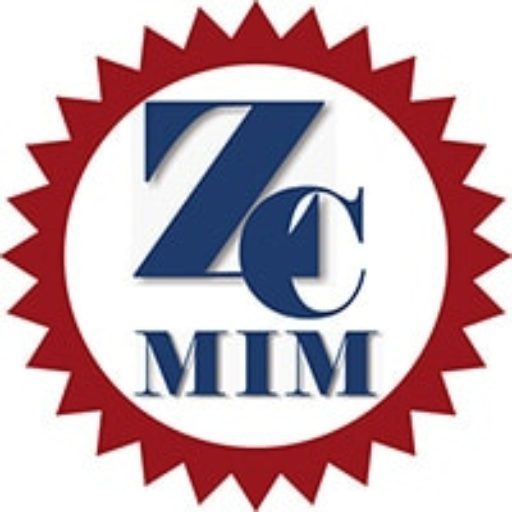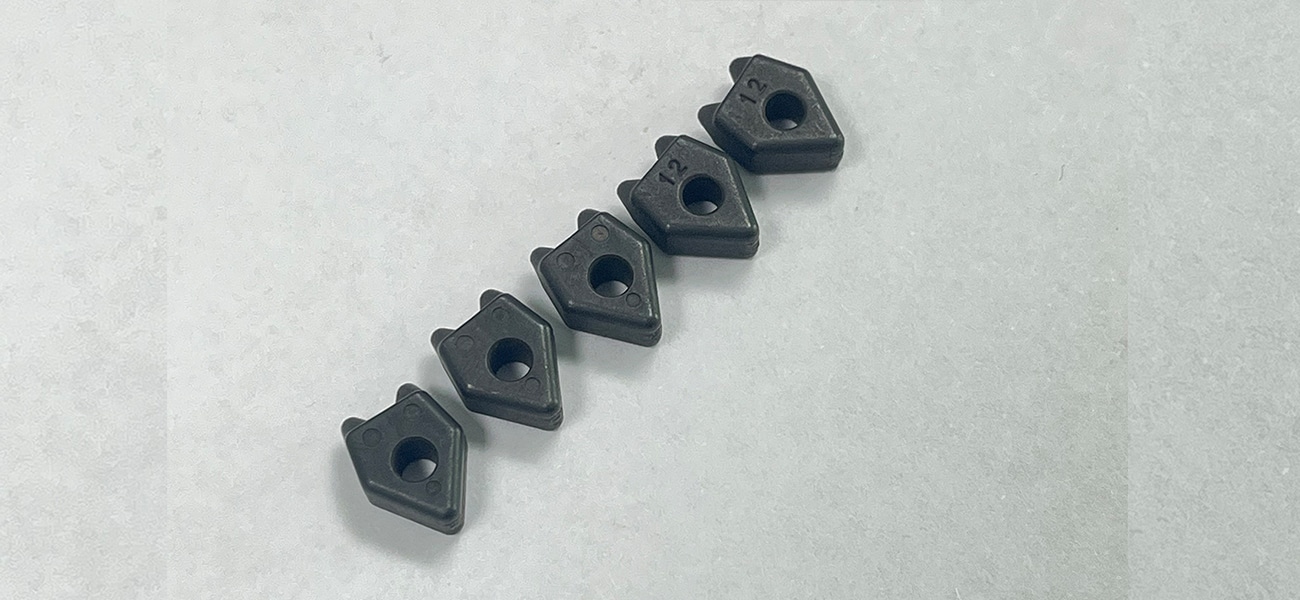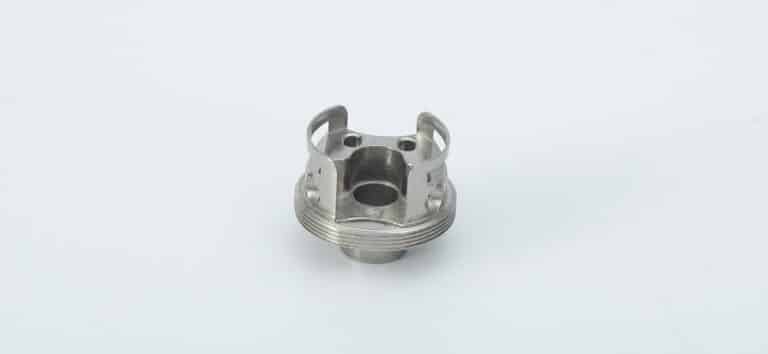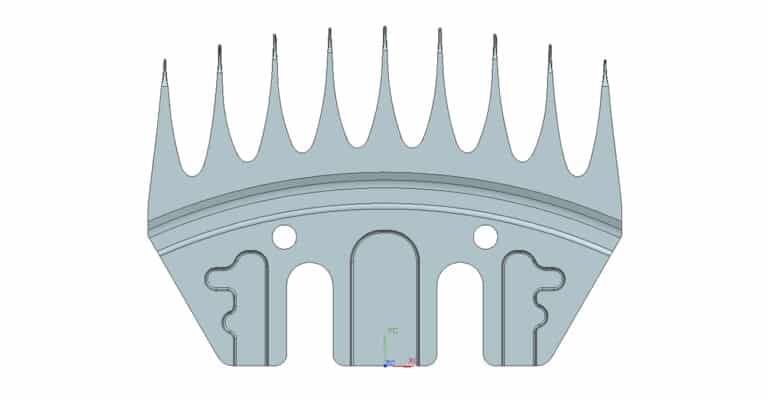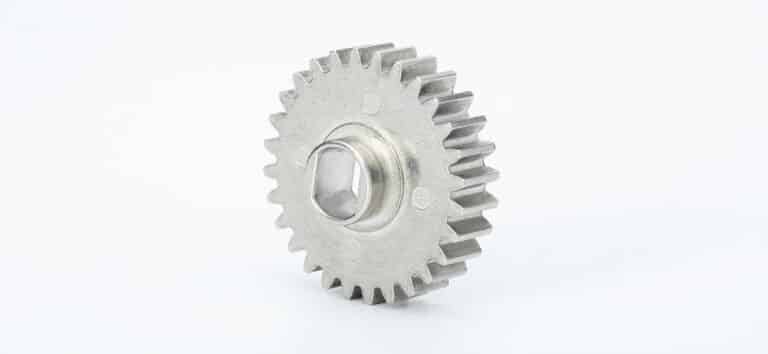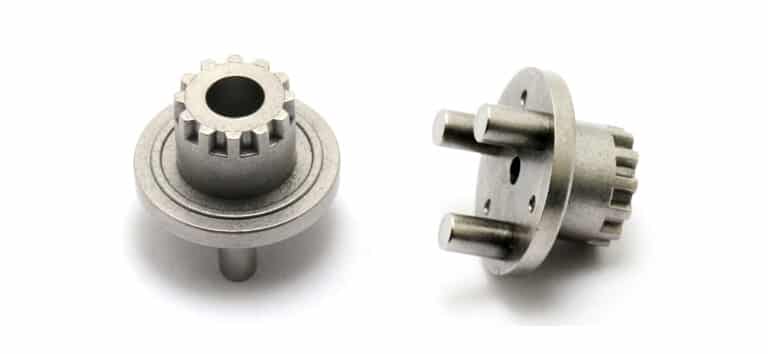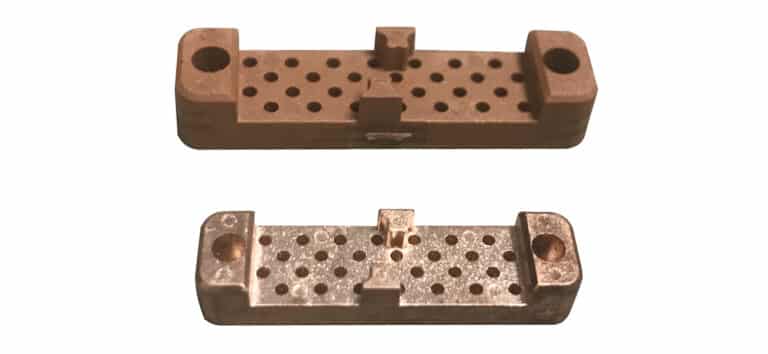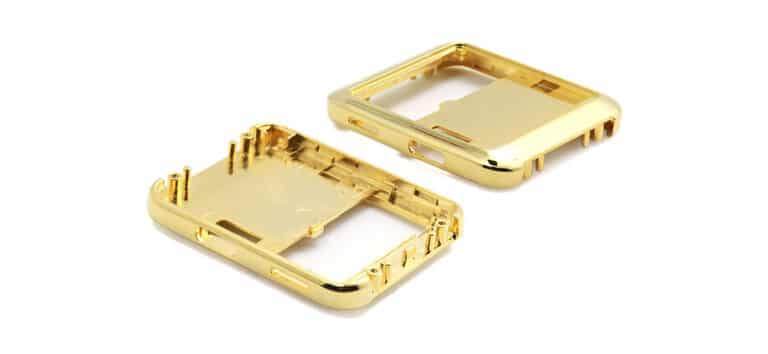MIM 4140
Introduction
4140 steel is a low alloy steel with chromium, molybdenum, and manganese. It has wide application in numerous industries, due to the excellent properties of high toughness, fatigue strength, abrasion&impact resistance. There is little grades can match the versatility and usefulness of 4140.
4140 steel (42CrMo4) relies on other element (except iron, carbon) to enhance the mechanical properties. The addition of chromium, molybdenum, and manganese will increase the strength and hardenability, chromium and molybdenum aslo promote corrosion resistance. Manganese increases hardenability and as a deoxidizer, it can combine with sulfur to improve machinability and carburization efficiency.
There are four key mechanical properties of steel 4140:
- Tensile Strength
- Toughness
- Ductility
- Hardenability
4140A Chemical Composition
| MIM 4340 | Iron | Nickel | Chromium | Molybdenum | Carbon | Silicon | Manganese |
| Percent by Weight | Bal. | 0.00-0.30 | 0.90-1.20 | 0.15-0.30 | 0.30-0.50 | 0.17-0.37 | / |
4140B Chemical Composition
| MIM 4340 | Iron | Nickel | Chromium | Molybdenum | Carbon | Silicon | Manganese |
| Percent by Weight | Bal. | 0.00-0.30 | 0.90-1.20 | 0.15-0.30 | 0.30-0.50 | 0.17-0.37 | 0.50-0.80 |
Mechanical Properties (Sintered)
| Material | Density | Tensile Strength | Yield Strength(0.2%) | Hardness | Elongation(% in 25.4mm) |
| MIM 4340 | ≥7.50g/cm³ | ≥700Mpa | ≥500Mpa | ≥200HV1 | ≥5% |
Mechanical Properties (Quenched + Tempered)
| Material | Density | Tensile Strength | Yield Strength(0.2%) | Hardness | Elongation(% in 25.4mm) |
| MIM 4340 | ≥7.50g/cm³ | ≥1500Mpa | ≥650Mpa | ≥400HV1 | ≥5% |
Common Applications
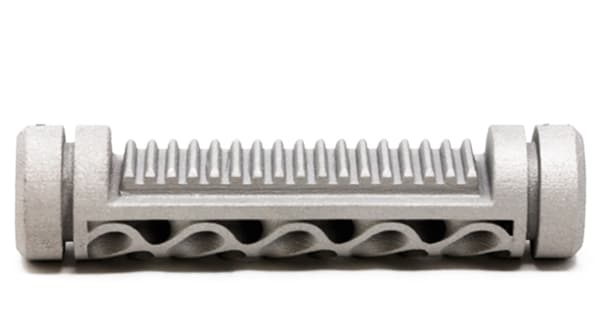
This linear pneumatic piston is made of 4140 low-alloy steel, it is applied to convert air pressure into rotary motion.
4140 Steel is one of the most versatile low-alloy steel, it has high toughness and tensile strength with abrasion and impact resistance. Steel 4140 is a heat-treatable steel with all-purpose, it is applied extensively in industries of automotive, oil&gas. The main components including gears, couplings, spindles, bolts and nuts.
4140 Sintering
Carbon Control
The carbon contents in final sintered 4140 are within 0.30-0.5%. The observed value of 90%-22µm, 90%-16µm and MA+CIP are 0.39%, 0.38%, 0.39 respectively at sintering temperature of 1100℃. In addition, similar data are achieved in other sintering temperatures.
Sintering Parameter
Similar to MIM 4340, the 4140 sintering temperature is between 1000-1300℃. The common sintering atmosphere is nitrogen.
Sintering Density
It is obvious that, all interconnected porosity in MIM 4140 is eliminated at different sintering temperature: MA+CIP and 90%-16 µm powders at 1100℃, while 90%-20 µm at 1200℃. All density will achieve the maximum value at 1300℃.
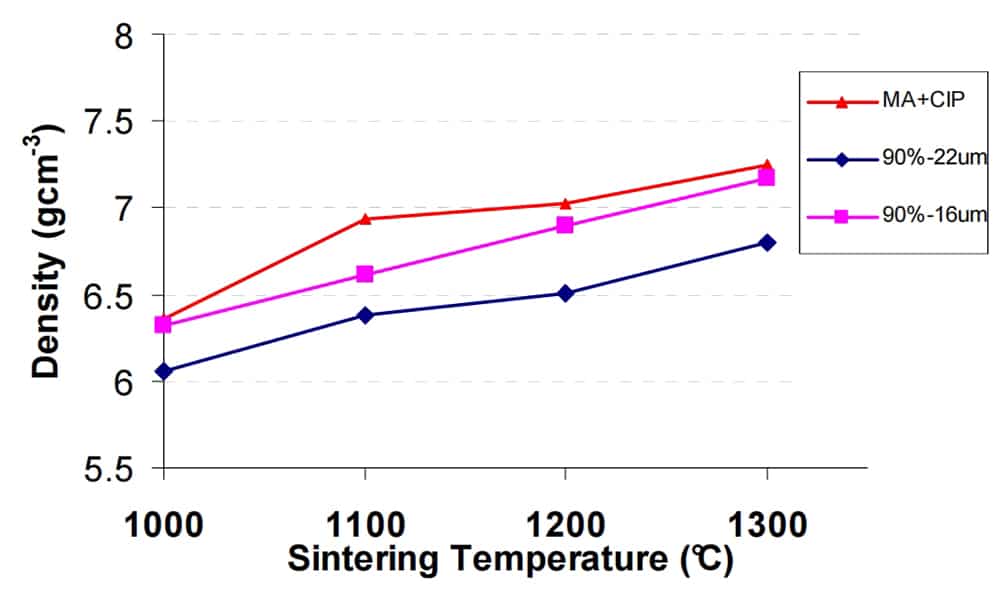
4140 Density in Different Sintering Temperature
Micro-structure after Sintering
From the micro-structure analysis of 4140 in different sintering temperature. We can notice that in lower temperatures between 1000-1100℃, there is a relatively even distribution of pearlite and austenite. The only difference is the coarsening of grain size. In 1200℃, the significant change is non-uniform distribution of bainite and pearlite. At 1300℃, the main micro-structure is bainitic with little pearlite on the surface.
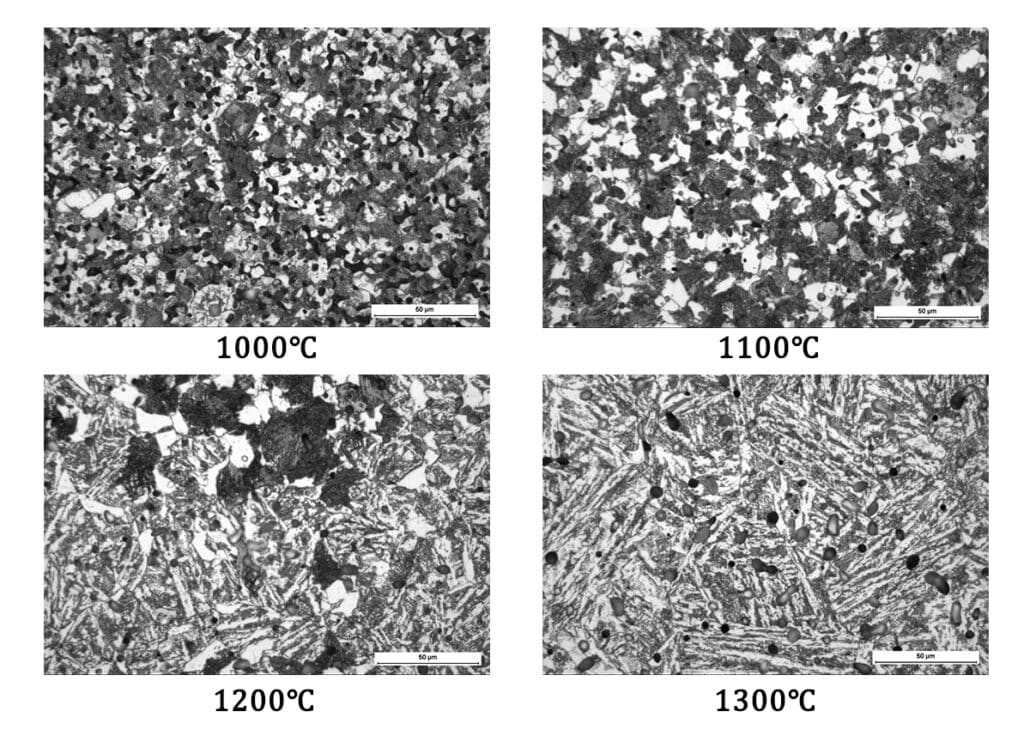
4140 Micro-structure in Different Sintering Temperature
Sintered Hardness
Similar as MIM 4340, MIM 4140 achieves the highest hardness value at 1200℃ sintering after 250℃ tempering. Even higher temperatures result in no increase in hardness.
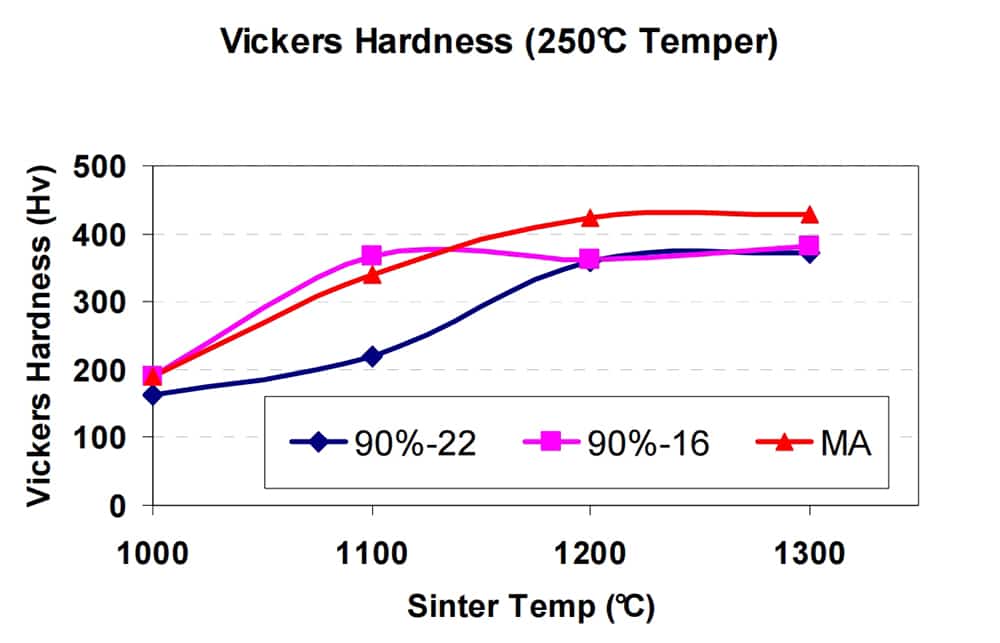
4140 Hardness in Different Sintering Temperature
Tensile Strength
From the tensile strength data in following graph, 4140 parts have increased tensile strength with increasing sinter temperature. There are the smallest increase between 1200℃ and 1300℃.
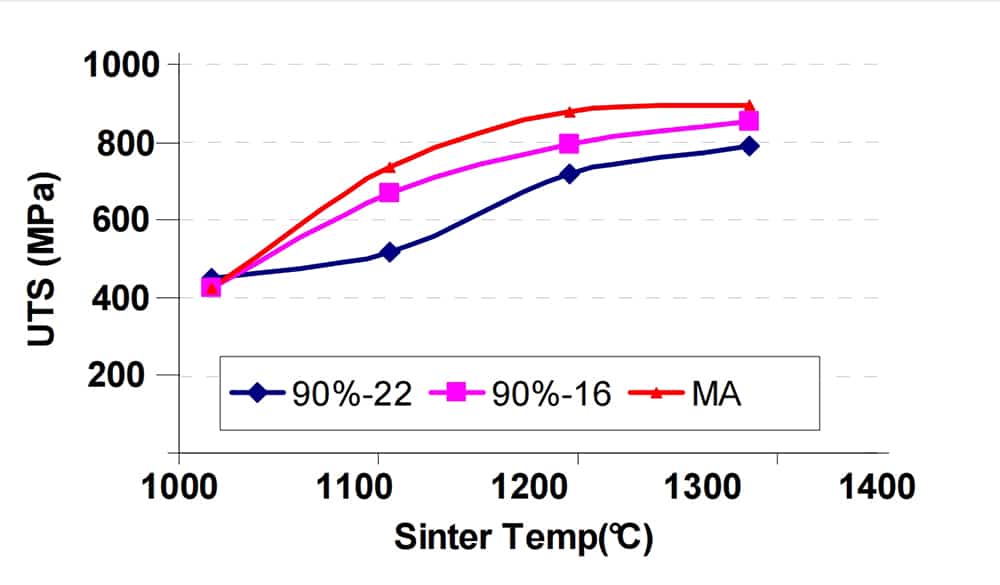
4140 UTS in Different Sintering Temperature
After 250℃ tempering, the highest UTS value are achieved at significantly lower sintering temperature. It is obvious that, tempering can increase the peak UTS double as the sintered strength levels.
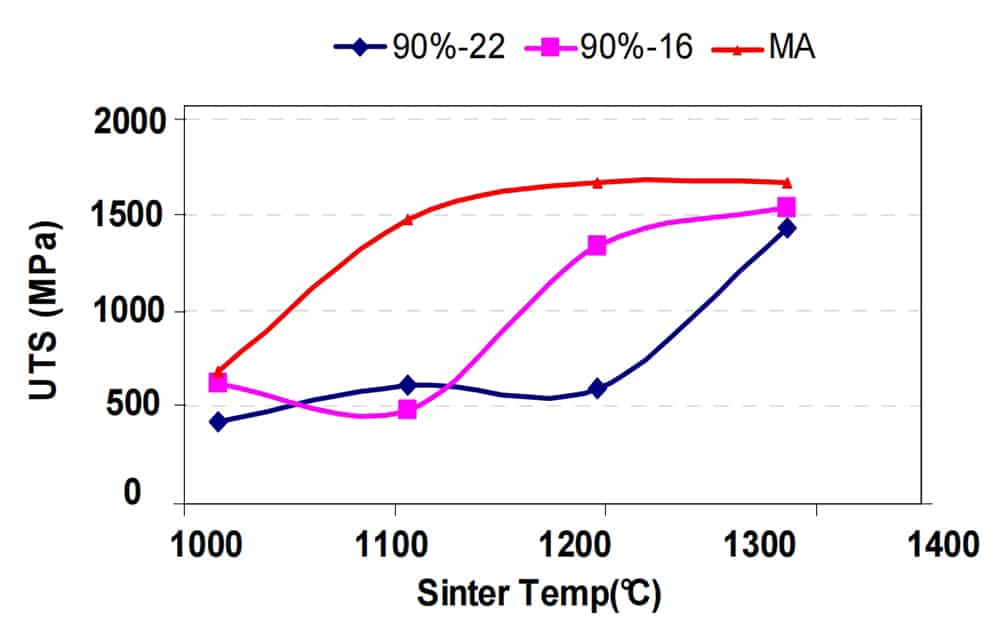
4140 UTS after 250℃ Tempering
Heat Treatment of MIM 4140
Quenching
Heat 4140 parts to 845℃, hold until the temperature is uniform in the section. Then quenching in oil.
Annealing
Heat to 880℃, hold until the temperature is uniform in the section. Then cool down slowly in the furnace.
Tempering
Heat 4140 alloy at 200-650℃ for tempering, this depends on the required hardness levels. Normally, lower tempering temperature will increase the hardness of 4140 steel. Such as tempering at 316℃ will achieve 1500 Mpa tensile strength, while 540℃ tempering get 850 Mpa.
Hardening
Steel 4140 is harden by cold working, heating, quenching. All these methods can increase the surface hardness of 4140 parts.
MIM 4140 Post Processing
Machining
MIM 4140 has excellent machinability in both sintered and annealed condition.
Shaping
4140 has high ductility, it can be shaped after sintering and annealing. As it is tougher than plain carbon steels, it requires more pressure and force for forming process.
Welding
Sintered 4140 parts can be welded in conventional techniques. But this will affect the mechanical properties in heat-treated conditions. Therefore, post-weld heat treatments is recommended.
4140 vs 4340
4140 steel is a chromium-molybdenum alloy. It has strong tensile strength, good wear resistance, toughness and ductility. Its high hardness makes it suitable for high-strength components in long-time working without brittleness and easy damage.
4340 steel is a nickel-chromium-molybdenum alloy. It has excellent strength at high temperatures. In addition, its great fatigue strength is ideal for aerospace and automotive industry. 4340 parts can withstand heavy loads over long time period without failing or breaking down. Moreover, 4340 steel also has good corrosion resistance, and high temperature withstanding.
Common Comparison
- 4140 steel is cheaper than 4340 steel
- 4340 is more difficult to weld than 4140
- 4140 has higher wear resistance than 4340
- 4340 steel is more difficult to machine than 4140 steel
Conclusion
ZCMIM has excellent experience in MIM 4140 steel. We apply different alloy power size, sintering temperatures, heat treatment to achieve specific density and mechanical properties. Contact us for your next MIM 4140 project.
